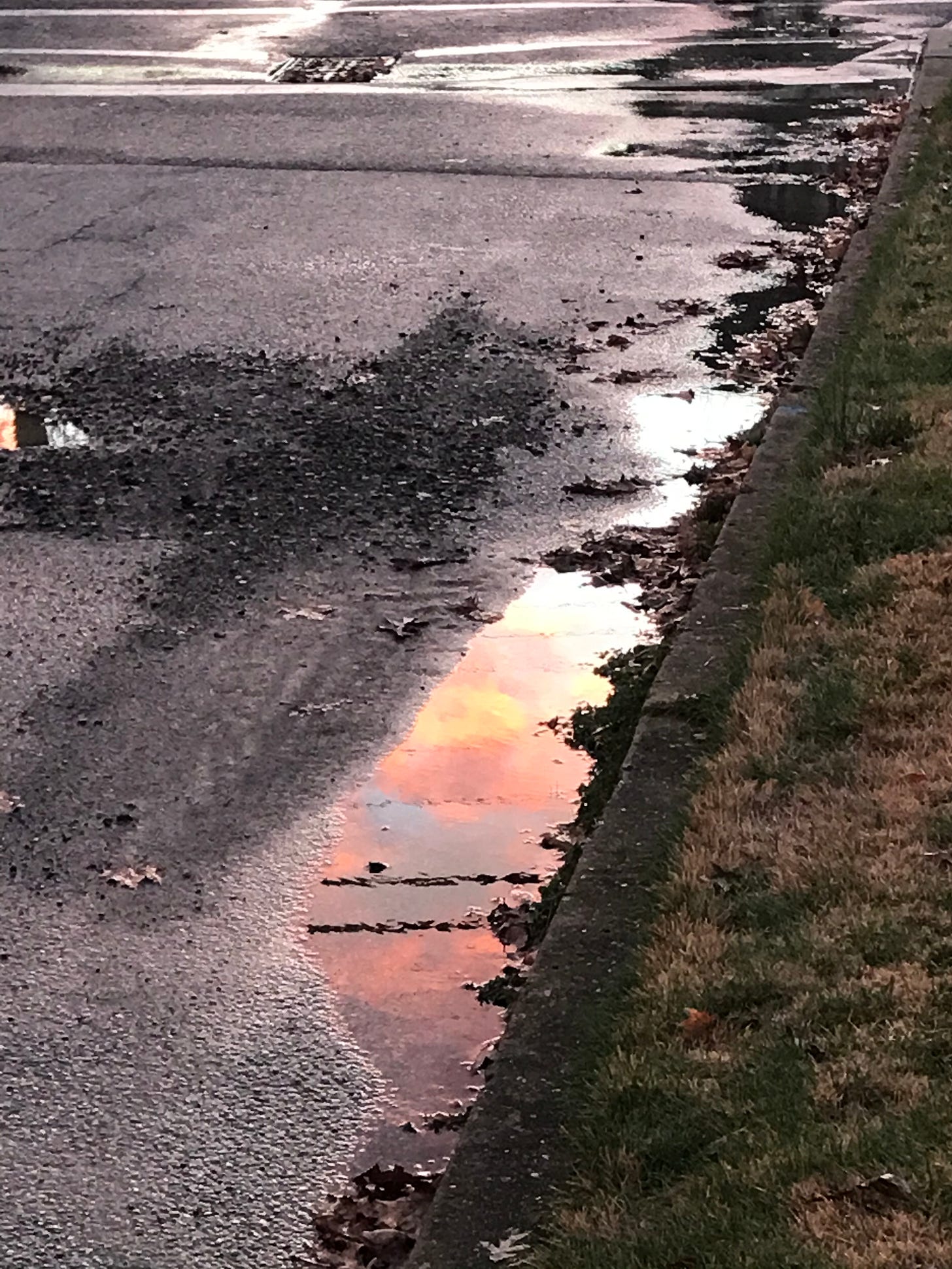Loving a Broken World in a Tinselly Season
Notes on Longing, Lament, and the Expected Cheer of Christmas
Hello friends! This post is the second in a series called Psalms of Unknowing, where I explore overtly spiritual & religious subjects. If that’s not your thing, no worries! You can unsubscribe to this series and still receive my very occasional author newsletter, The Slow Take.
Please know that this is a pro-LGBTQ space. Also, I believe God is bigger than any one religion.
After a few decades of winding faith and doubt, I became an Episcopalian in my thirties. It wasn’t hard for me to believe that there’s a Great Unseen who created (among all other things) wheatgrass, gravity, Saturn, and snails. It wasn’t hard for me to imagine that this same God ventured into the body of a baby who at first couldn’t hold up his head, who eventually jammed his divine toe into his teething mouth. It wasn’t even hard to believe that this baby grew to be thirty-two, was murdered by an imperialist empire, and then came back from the dead a few days later.
You know what was hard? Other than the whole love your neighbor as yourself thing? A surprising challenge of my faith has been the extended feast of Christmas. Celebrating for twelve straight days a promise I don’t yet see. Engaging in twelve complete days of unabashed hopeful earnest . . . joy. During Christmas, we limit our work, and blare our major-chord anthems, and jingle our bells, and smell our frankincensy incense . . . all freaking twelve days. It can be tiring to sustain cheer for so long.
Advent is easier for me. Advent is the season of waiting in the dark, of naming what’s promised but not yet here. We fill four weeks with minor chords and quiet prayers. We light our candles, sing our haunting hymns, and give voice to the incessant longing inside every human soul.
When I first joined the Episcopal Church over a decade ago, I heartily embraced the four weeks before Christmas called Advent. Treating it like a mini pine-scented Lent, I chose something to abstain from: social media. I lit my pink and purple candlesticks on the wreath, and sung all eight gorgeous verses of “O Come O Come Emmanuel.” I held onto the hope of a healed world for twenty-some days. As we neared Christmas day, I was excited! I felt I’d earned the twelve-day feast.
When the day-calendar flipped to December 26, I was taken off-guard. Not only did the neighbors tear down their lights. The icebergs were still hollowing out, drone attacks continued, lead-tainted waters were still poisoning citizens, and world peace did not descend on every nation like doves holding wee olive branches. The bumper stickers still read things like, “Watch Out for the Idiot Behind Me” and “My Kid Can Beat Up Your Honors Student.”
Of course the world wouldn’t be fully redeemed just because one random American woman stepped her foot into the liturgical calendar. I didn’t really expect healing for all of humanity. I guess I just expected to see more, I don’t know, Christ—that is, evidence of the union between humans and the divine.
One year in late December, the outdoor thermometers in New Jersey reached the mid 60s. My kids and my husband and I ventured to the local playground, where we gripped chain-link swings and slipped down corkscrew slides. The faces of my family members were full of sun-soaked smiles. But 60% of my brain was occupied by two words: climate change. A few weeks before, a funeral had been held for an iceberg. I tried just to enjoy the weather. On the fourth day of Christmas, my true love gave to meeeee. . . an unseasonably (global) warm(ing) day! But the impending loss of however many species prevailed.
All this speaks to my predisposition: I tend to lean toward what’s wrong, what’s missing. I align with writer Christian Wiman here, who told Christianity Today: “I tend to feel the tragedy of life more than its comedy and must constantly check and correct this inclination.”
When the malaise didn’t lift that Christmastide, I complained about the disappointment of the season to my spouse. He’s a priest. He’s also excellent at joviality. I thought he’d lightheartedly school me on how to more effectively party.
But no. Like any good spouse, he keeps surprising me. He told me the designers of the liturgical calendar already had my lamentation in mind when they arranged the feasts of Christmas. Just two days after the birth of Christ comes the Feast of Holy Innocents.
What’s that? I asked. It sounded vaguely sweet.
He cringed. A bunch of massacred children. Age two and under.
I looked at him in horror.
He nodded.
And the day after Christmas, he added, we celebrate St. Stephen, a guy who was stoned to death at age 36.
My face scrunched in anguish. But reader, I also felt relief. Not because of the murders. Because, it turns out, the arrangers of the holy calendar knew we might need a little lament, even during a days-long party. We might need to name and acknowledge the worst of the ages, even as we affirm what books of wisdom across several religions tell us: God is with us.
I’m better prepared now. I know that observing four weeks of Advent do not necessarily lead me into a field of pure joy. I know the liturgical seasons walk us through the story of God in creation, but that it’s also our job to witness and bear out the truth of that story—in our love for each other, in our love for God, in our love for the world.
Part of loving the world, I think, is lamenting its brokenness. But part of loving the world is also noticing its beauty, praising what can be praised, naming what delights—what is of light. This is why so many of us love Ross Gay’s work, especially his books of delight. Braces on adults. A lost mitten hanging on a tree branch. The music of El DeBarge. A tomato plant buckled into a plane seat. By noticing small delights, Gay keeps turning his gaze—and his reader’s—on the world’s beauty. On the things that stir our love for it—and our love for each other. And he does this even in the midst of naming our grief and sorrow. In fact, in his work the two notes of sorrow and joy are inextricably linked.
To see the world as only terrible is to ignore its beauty. To see the world as only beautiful is to remain ignorant of its terribleness. How do we hold an awareness of both? Especially when the world is kind-of always on fire. Especially when, right now, someone, somewhere, is trying to claw their way out of an apocalypse. And someone else is being born (which is another way to say, clawing their way out of an apocalypse.)
In that same Christian Wiman interview, the interviewer quotes George Herbert: “I will complain, yet praise / I will bewail, approve: / And all my sour-sweet days / I will lament, and love.” The interviewer asks Wiman, “Why is lament important?”
Wiman replies, “You could have reframed the question to ask, Why is praise important? Herbert is careful to insist on both. Christianity is predicated on a dual movement: the cross and the resurrection.”
Wiman has been living for two decades with cancer. He wills his head to turn toward the world’s beauty, not in order to deny suffering. He does it to widen the aperture for a greater truth. We are broken; we are also blessed. We are burned; we are breathing. This world is terrible; it’s also beautiful.
I suspect I’ll always like Advent more than Christmas. It gives name to our Holy Longing, which feels realer to me than the actual Holy. It lets us pause and decorate our longing with twinkly little lights of promise. It says, Not yet, but soon.
We’ll likely wake on Christmas morning to a world still very much broken. War. Hate crimes. Gun violence. In other words: humans failing to see each other as human. Maybe a few transformed souls will peel off their cruelest bumper sticker and replace it with a “I Break for Shar-peis.” Maybe not.
But the days will get longer. In the Northern Hemisphere, Christmas begins three days after the winter solstice. The arrangement is intentional, meant to merge the birth of Christ with a simple earthly fact: The light does grow. The bulbs in the ground do, in time, poke green from the soil, then bloom.
And that’s a truth we can carry not just for twelve days but for years and a lifetime: in the deepest dark, the light is still promised. The infinite love of the Great Unseen is bigger than every planet and every lightyear between every planet. It’s bigger, even, than any one religion. And miraculously, it can also fit inside our small and often stingy human hearts.
In the Christian tradition, that’s the offering of the Christ child: Love might just fill every heart enough to heal us.
Blessed Advent, friends, if you observe. And, Happy Christmas.
For other takes on this season of Advent, I highly recommend:
‘s “Advent Advice: Make a Wreath, Then Throw it in the Fire.” I love how this piece enacts the dual movements of awe and horror, worship and rage, through its oscillating form. I mean: It’s nothing like a typical Substack post. Read it like a poem, not like a listicle.- ‘s “Conversations with Mary, Part 2”. Jolley invites us to un-sanitize the birth story. Every birth story, really, but especially the one where God was born.
Lastly, re: ways to hold two hard things at once, if you haven’t listened to Ezra Klein’s interview with Rabbi Sharon Brous about Israel, antisemitism, Gaza, and how the oppressed can become the oppressor, I highly recommend it. Rabbi Brous outlines the work required of every human heart—right now and probably always.








I too find the twelve days of Christmas hard (nearly impossible) to celebrate—it's such a swim against the cultural tide!
loved this reflection xx
A formal Advent practice was never a part of my Christian journey-I’m thinking I’ve missed an important part of the celebration of Christmas. I love your perspective on the season. I may set aside time this year to purposefully lament as well as celebrate. It won’t be hard as I’ve kind of been a lamenter all my life.